News from the census American Community Survey is generally good for the 2015 year. Mexican American college enrollment was up from 18.7% to 18.9% in the 2014 and 2015 years. Graduate or professional degree attainment was also up from 2.9% to 3.0%. The number of bachelor’s degrees granted to Mexican American students rose from 7.6% in 2014 to 7.8% in 2015.


In spite of these gains, Mexican Americans still remain at the bottom of the ladder when it comes to earning a bachelor’s degree. Even after broadening the group to Latinos or Hispanics, this group still lags behind. According to the Pew Hispanic Center: “As of 2014, among Hispanics ages 25 to 29, just 15% of Hispanics have a bachelor’s degree or higher. By comparison, among the same age group, about 41% of whites have a bachelor’s degree or higher (as do 22% of blacks and 63% of Asians).” Pew reports that the main reasons for this low graduation rate is that Hispanics are less likely “to enroll in a four-year college, attend an academically selective college and enroll full-time.”
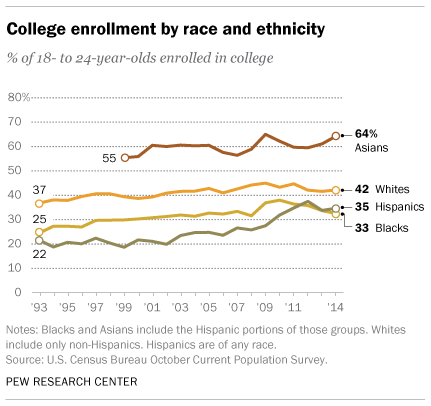
Also in the good news column, the University of California will continue to push for a greater number of underrepresented minorities; namely, Chicano/Latino students whose resident freshmen numbers rose from 2.7% to 32.3% of admitted California freshmen. In other good news, the proportion of Chicano/Latino students transferring from community colleges increased to 29.3% from 26.8% for 2015.
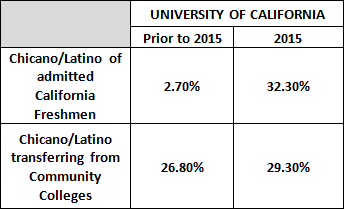
Occupations, including those in management, business, science, and art, fared better for Mexican Americans. The number of Mexican Americans filling these occupations rose from 17.4% in 2014 to 17.5% in 2015.

The total number of Hispanics filling these occupations was 16.1% in 2015, a bit lower than Mexican Americans specifically.
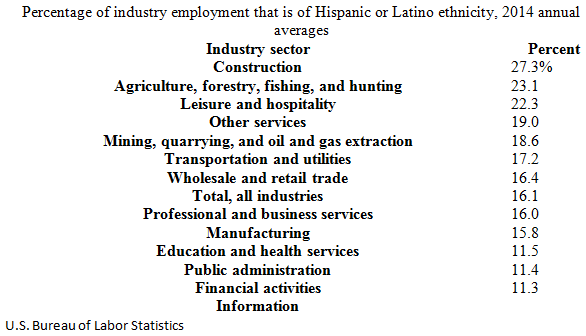
The report shows that industrial employment for Mexican Americans remained the same for 2014 and 2015 at 10.2%.
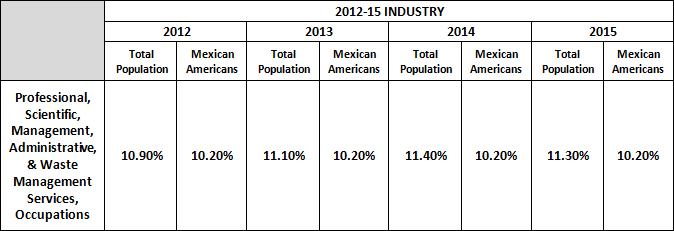
The figures for Hispanic or Latino employment for 2015 and 2016 show a healthy increase.
According to the Pew Hispanic center, “Construction, professional and business services, health services, financial services and food services…showed healthy gains.” Most of the jobs gained by native-born Hispanic workers were in manufacturing, mostly durable goods (82,000 Hispanic workers in this industry), followed by wholesale and retail trade (79,000), publishing, broadcasting, communication and information services (55,000), and construction (54,000).
Foreign-born Hispanics had the most job gains in construction (417,000), followed by business and professional services (179,000). Together, those two industries accounted for almost three-quarters (74%) of all jobs gained by foreign-born Latinos between 2005 and 2006.
The business and professional services sector, which ranges from management and technical services to janitorial, landscaping, and waste management services, is also a key employer for non-Hispanic workers. Of the total increase in employment in 2005-06, non-Hispanic workers accounted for 410,000 employees in the industry, native-born workers 327,000, and foreign-born workers 83,000.
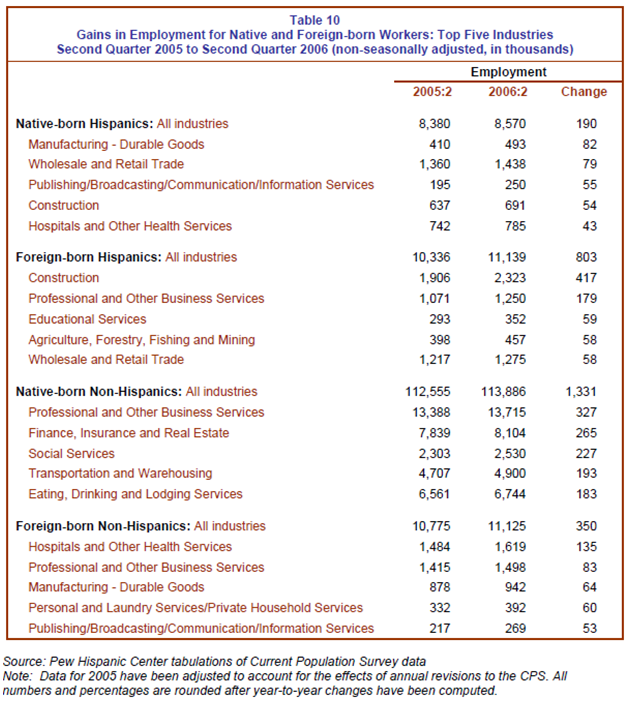
Sources
- Census Bureau, Selected Population Profile in the United States: 2015
- Pew Research Center
- University of California
- Bureau of Labor Statistics

 47 international judges evaluated some 709 beers from a total of 136 breweries across Mexico, with the beers classified in 43 categories. And three craft breweries were awarded.
47 international judges evaluated some 709 beers from a total of 136 breweries across Mexico, with the beers classified in 43 categories. And three craft breweries were awarded.









